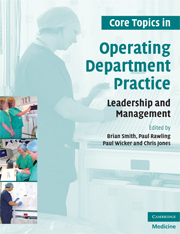Book contents
- Frontmatter
- Contents
- List of contributors
- Foreword
- Preface
- 1 Managing change in perioperative education
- 2 The role of the operating department manager within the context of the organization
- 3 Action learning: a new way of problem solving in perioperative settings
- 4 Agenda for change: what do theatre staff need to know?
- 5 The SWOT analysis: its place in strategic planning in a modern operating department
- 6 Corporate governance: setting the scene for perioperative practice
- 7 Managing different cultures: adversity and diversity in the perioperative environment
- 8 Leadership in perioperative settings: a practical guide
- 9 Management and leadership of advanced practice
- 10 Managing conflict in perioperative settings
- 11 The management and organization of emergency operating lists
- 12 Organizational culture
- 13 Development matters in the NHS; including a perioperative approach to the KSF
- 14 Equipment procurement: a purchaser's guide for theatre managers
- 15 The reflective practitioner in perioperative settings
- 16 New ways of working in perioperative practice
- 17 Damned if you do and damned if you don't: whistle blowing in perioperative practice
- 18 A manager's experience of recruitment and retention
- 19 The management of change
- Index
- References
6 - Corporate governance: setting the scene for perioperative practice
- Frontmatter
- Contents
- List of contributors
- Foreword
- Preface
- 1 Managing change in perioperative education
- 2 The role of the operating department manager within the context of the organization
- 3 Action learning: a new way of problem solving in perioperative settings
- 4 Agenda for change: what do theatre staff need to know?
- 5 The SWOT analysis: its place in strategic planning in a modern operating department
- 6 Corporate governance: setting the scene for perioperative practice
- 7 Managing different cultures: adversity and diversity in the perioperative environment
- 8 Leadership in perioperative settings: a practical guide
- 9 Management and leadership of advanced practice
- 10 Managing conflict in perioperative settings
- 11 The management and organization of emergency operating lists
- 12 Organizational culture
- 13 Development matters in the NHS; including a perioperative approach to the KSF
- 14 Equipment procurement: a purchaser's guide for theatre managers
- 15 The reflective practitioner in perioperative settings
- 16 New ways of working in perioperative practice
- 17 Damned if you do and damned if you don't: whistle blowing in perioperative practice
- 18 A manager's experience of recruitment and retention
- 19 The management of change
- Index
- References
Summary
Key Learning Points
Appreciate the nature of corporate governance
Understand the public policy initiatives that gave rise to corporate governance in healthcare
Appreciate the implications of failing corporate governance
Introduction
Corporate governance is the way in which governing boards direct, control and manage organizations and public bodies. One of the roles of stakeholders is to recognize an organization's obligations to society. Good governance leads to good management, performance and financial management, and ultimately to good outcomes for patients and organizations.
This chapter will identify the core principles of good governance, the underlying corporate governance codes, their application and the roles and responsibilities of all involved. The aim of good governance is to understand accountability for the benefit of all stakeholders, including patients.
Adopting a comprehensive corporate governance framework is the cornerstone of sound business conduct and is fundamental to the success of an organization. Failure in governance is a threat to the future of organizations. This was seen in recent examples of poor corporate governance in healthcare, for example in the organ retention scandals, and in business, for example the events at Enron and Maidstone (discussed later in this chapter).
- Type
- Chapter
- Information
- Core Topics in Operating Department PracticeLeadership and Management, pp. 39 - 48Publisher: Cambridge University PressPrint publication year: 2009

